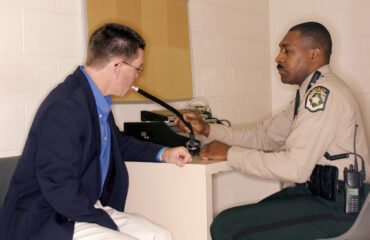Law Enforcement and Communities in Crisis
The United States, and other parts of the world, faces circumstances where death has occurred as a result of conflict between law enforcement and a member of the community. Few would argue against the proposition that law enforcement serves as the nexus between the community and the criminal justice system.
And yet attendees of the International Association of Chiefs of Police in their 2015 Policy Summit Report on Community/Police Relations stated “WHY ARE WE HAVING THIS CONVERSATION…AGAIN?” Summit participants acknowledged that “coverage of events in Ferguson (MO), New York (NY), and Cleveland (OH) provide stark examples of the culmination of rising tensions between the police and the communities they serve.”
Different Perceptions
I recall an incident that happened when I was a lieutenant riding along on patrol with the shift sergeant. It was one of those days that I had to get out of the office. He was a white officer that I’d known for some time and felt he was a decent man and a good cop. I noticed a young African American man walking down the street on what was a nice summer day. I thought “That is a good kid.” While his cloths were not expensive, they were clean and pressed. He had a book bag with books peeking out of a worn spot on the corner. As we passed him, he had an open, friendly look on his face. My partner suddenly said “Hmmm, I wonder what he is up to? You want to follow him?” We didn’t follow that young man, but what struck me about that conversation was how two goodhearted experienced professionals saw two different scenarios. More importantly, how does one develop a plan for addressing such an issue? Training? Recruitment? Policy change? I consider my former police department to be among the best trained in the nation, yet still there was a problem.
Today we live a technological age where law enforcement should expect to end up on camera. In the 2014 case of the state trooper from South Carolina, the entire incident is caught on his vehicle dash cam where he is subsequently arrested for shooting an unarmed man during a traffic stop. The South Carolina Law Enforcement Division released a second longer video that showed the officer telling his version of the incident to his supervisor which differed from what the vehicle’s camera showed. His attorney stated that the officer “feared for his life.” Is this the key? Examining fear levels? What about the student my partner and I saw walking home from school? He saw a suspicious person and I saw something totally benign.
Increasing Trust Not Trauma
The National Organization of Black Law Enforcement Executives (NOBLE) supports a 2015 report by Human Impact Partners entitled “Stress on the Streets: Race, Policing, Health and Increasing Trust not Trauma.” In the report’s forward the president of NOBLE states, “History is shouting at us, and its getting hoarse. The report calls for authentic, lasting dialogues between the public and police about histories of inequity in policing. It finds that the problem-solving and community policing approaches together are most effective in reducing crime, building trust, and addressing inequities. Put simply, it says what some of us in the field have known: we need to police in ways that are sensitive to issues that are important to the communities that we serve.”
It some ways, the problem can be more complex. For example, while serving as a national board member of (NOBLE), we became aware of a circumstance that involved a law enforcement organization putting up barricades in a crime-ridden community of color where identification was required to enter and only residents were given entry. NOBLE stood ready to intervene on behalf of that community when the community advised that they wanted the initiative and were OK with it. They said that it had been the most peaceful the neighborhood had been in some time. While on the surface this may have appeared to be extreme, clearly this was a strategy that this police agency put into action after working with the community and being sensitive to their needs and the conditions they were subjected to.
Building Trust
Most professionals agree that trust is essential for effective law enforcement. What does it take to build and maintain an effective working relationship between law enforcement and citizens?
The Police Executive Research Forum (PERF) states that trust is an important element in police legitimacy which PERF defines as “[t]he belief that police ought to be allowed to exercise their authority to maintain social order, manage conflicts and solve problems in their communities.”
The goal of law enforcement should be to encourage dialog and build a greater understanding between the criminal justice system and the community. An end result hopefully will be an increase in the level of trust and cooperation on both sides. Relationships that remain healthy are vigilant and nurturing.
Community Town Hall Forum
Not long ago I chaired and worked on an initiative to hold a Community Town Hall Forum on the criminal justice process. We utilized a scenario of an incident between law enforcement and members of the community and invited questions and comments from the public. Our guest speaker, Ronald L. Davis, Director of the Office of Community Oriented Policing Services (COPS), United States Department of Justice, observed that our community’s proactive efforts were notably exceptional, and brought a diverse set of people to the table. He further stated that situations like the one in Ferguson are the result of simmering problems that boil over when they are not addressed.
The criminal justice process can be complex. Doing the right thing legally may not at times appear to be the fairest option. It’s important to develop an effective means to educate the community about the justice process. Addressing common misconceptions and dispelling myths associated with the criminal justice process can go a long way in building community trust.
Everyone Has a Part in Building Trust
PERF has led critical discussions on the importance of police legitimacy to building community trust and outlines several critical factors:
- Public confidence and trust in the police
- The willingness of residents to defer to police authority and the law
- The belief that police actions are morally justified and appropriate to the circumstances.
Yale Law School professors Tracey Meares and Tom Tyler and the National Network for Safe Communities are exploring how to improve relationships between law enforcement agencies and communities. They have written about how to strengthen the legitimacy of the police and, with the help of the U.S. Department of Justice’s COPS Office, how to bring police and teens together for productive conversations.
Effective change calls for a willingness to do self-examination on both sides. As citizens we can enact change and develop a better way to manage the criminal justice process where everyone feels that they will be treated fairly and respectfully. We must be a part of the change that we want to see.
What do you think? What are you going to work to change?
Get more articles like this
in your inbox
Subscribe to our mailing list and get the latest information and updates to your email inbox.
Thank you for subscribing.
Something went wrong.









